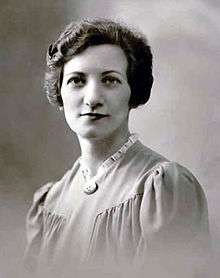Léa Roback

Léa Roback (3 November 1903[1] – 28 August 2000) was a Canadian trade union organizer, social activist, pacifist, and feminist. She campaigned against exclusion, violence, racism and injustice.[2] A polyglot and a suffragist, she was a pioneer of feminism in Quebec. A Syndicalist,[3] Communist and a Marxist, she opened the first Marxist book store in Montreal.
Early years
Born in Montreal on Guilbault Street in 1903, the second of nine children,[4] she was the daughter of Polish Jewish immigrants. Her father was a tailor who, along with his wife, Fanny, ran a general store. They were the only Jews in Beauport, the town where Roback grew up.[5] She spoke Yiddish at home, French with Beauport locals, and English at school. Her family valued reading and the arts. In her youth, she was influenced by her maternal grandmother, an independent woman.
With her family, Roback returned to Montreal in 1915. While working at British American Dyeworks, she became aware of the differences between the various sectors of Montreal society. Her next job was as a cashier at Her Majesty's Theatre. Interested in literature, she saved money to enroll at the University of Grenoble in 1926,[5] earning a Bachelor of Arts degree.[6] On her return from Grenoble, she joined her sister in New York City. In 1929, she went to Berlin to visit her brother Henri, a medical student. She learned the German language, took university courses, and taught English.[6] She also visited England and Italy,[2] developing a strong commitment to Communism.[7]
Career
In 1929, Roback became a member of the Communist Party of Canada. She felt seduced by the socialists, but she believed they did not put their words into action, hence she shifted her support to Marxism-Leninism. In her 1988 interview with Nicole Lacelle, Roback said that it was during this period that she gained genuine political consciousness. In the fall of 1932, when the war in Europe escalated, Roback, a Jew and a foreigner, was forced to leave return to Montreal. In 1934, she spent a few months in the Soviet Union with a lover.[lower-alpha 1] Returning for good to Montreal, she participated in the organization of the unemployed, which was led by Norman Bethune. She also worked at the Young Women's Hebrew Association. In 1935, she established the first Marxist bookshop in Montreal,[6] Modern Book Shop.[5]
With Thérèse Casgrain, Roback fought for woman's suffrage in Quebec in 1936.[4] In the same year, she worked with Rose Pesotta, a veteran union organizer from New York, to establish the International Ladies' Garment Workers' Union (ILGWU) in Montreal, leading a strike of 5,000 women in 1937. Roback unionized RCA Victor in 1941, where she remained until 1951. She won the first union contract for women in 1943 but did not want to become a union representative or climb up union power structure. In the same year, Roback became a political organizer for Fred Rose.[5] She left the Communist party in 1958.[8]
In 1960, she became a member and played an active role in the organization "Voice of Women" (La Voix des Femmes in Montreal)[5] alongside Madeleine Parent, Thérèse Casgrain, and Simonne Monet-Chartrand. She denounced the Vietnam War and apartheid in South Africa, campaigned against the proliferation of nuclear weapons, and was a proponent of free access to a quality education. A feminist, she fought to obtain the right to vote for the right to abortion and access to contraception. Roback also fought for the residents of Saint-Henri to receive decent housing. At the age of 83 and in the pouring rain, she participated in the women's march for pay equity. In 1985, she became an honorary member of the Canadian Institute for Research on Women.[4] She died in Côte-des-Neiges in 2000, becoming a Knight of the National Order of Quebec in the same year.
Legacy
Her memory is perpetuated by the work of the Lea Roback Foundation, created in 1993,[4] which provides scholarships to socially-committed women.[8] "Le centre Léa-Roback", a research center in Montreal for social inequalities, is also named in her honour, as is the Maison Parent-Roback in Old Montreal. Sophie Bissonnette made a documentary on Roback's life in 1991.[5] Two streets were named in her honour in the 2000s: Rue Léa-Roback in the Saint-Henri district of Montreal, and a street of the same name in Beauport, where she spent time in her youth.
Notes
References
- ↑ "The Adventures of Lea Roback". Jewish Public Library. Retrieved 10 May 2014.
- 1 2 "Léa Roback (1903–2000) Chevalière (2000)" (in French). Gouvernement du Québec. Retrieved 10 May 2014.
- ↑ Ferretti, Lucia (1990). "Madeleine Parent, Léa Roback, Entretiens avec Nicole Lacelle by Nicole Lacelle". Labour/Le Travail (in French). 25: 247–249. Retrieved 10 May 2014.
- 1 2 3 4 5 "Léa Roback". Library and Archives Canada. 16 September 2010. Retrieved 10 May 2014.
- 1 2 3 4 5 6 "Lea's biography". Fondation Lea Roback. Retrieved 10 May 2014.
- 1 2 3 4 5 Forster, Merna (2004). 100 Canadian Heroines: Famous and Forgotten Faces. Dundurn. p. 214. ISBN 978-1-55002-514-9.
- ↑ Lindley, Susan Hill; Stebner, Eleanor J. (2008). The Westminster Handbook to Women in American Religious History. Westminster John Knox Press. p. 183. ISBN 978-0-664-22454-7.
- 1 2 Rioux, Michel (16 December 2013). "Léa Roback". The Canadian Encyclopedia. Retrieved 10 May 2014.
External links
- Biography at Parti communiste du Québec (French)
- Interview at Radio-Canada (French)
- Centre Léa Roback (French)